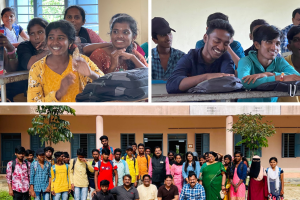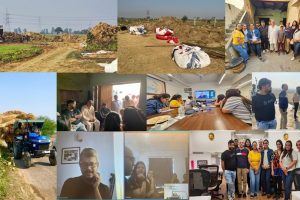A tennis parent reflects on how many of the coping mechanisms and strategies that her young son deployed to grow as a player have proven to be equally effective in enterprise building.
Every entrepreneurial journey is different in its own way but unpredictability is a given in all of them. In our own quest to build an organically grown telemedicine company, we have experienced– and continue to experience regular ups and downs. And as we watch our son in his pursuit of success on the tennis circuit, we are struck by the similarities between these two journeys.
One point at a time
At work, we are often daunted by the long list of tasks to be completed. Then we think of the advice Adil’s coach consistently gives him: focus on each ball and take it one point at a time. And we attempt to do the same at work- training our sights on one task at a time and tackling it with focus and patience. Breaking a task down into smaller, more manageable pieces – one ball at a time, one point at a time – is an approach that works off the court as well.
In tennis, mishits and mistakes are common – the ball lands in the net or a needless double fault costs you the point. Champions have the ability to put that point behind them and move on to the next one. In many ways, enterprise building is like playing a long and grueling match. It calls for persistence as well as the ability to let go of things that are not working.
Learning from failure
In 2012, Adil was India’s #1 Under 12 player. A year later, in 2013, he could not win a match. What worked for him in one age category was just not working at the next level. He took a two-month break to work on mental toughness exercises and fitness training. This hiatus helped to break the early exit jinx that he had been dealing with earlier. When we have experienced a similar rough patch in our business – a spate of client exits, for example, – we have temporarily suspended our client acquisition efforts and gone back to the drawing board to work on our weaknesses. This strategy has helped us resurface with better offerings and service levels. Using setbacks as a route to improvement is as critical in business as it is on the sporting field. What worked yesterday may not work today and it is important for a company to constantly innovate and make changes that yield better outcomes and happier customers.
New turf; new tactics
At the beginning of 2016, Adil was India’s No. 1 player in the Under 16 category. He won the road to the Junior French Open and took the Indian Junior Davis cup team to the world group final. He was on a high, and a hero in India. Then, he came to Europe to play a series of summer tournaments and suffered a string of losses. Unused to playing on clay and somewhat intimidated by his bigger European counterparts, he was clearly out of his comfort zone. It took long hours of practice on European clay and a few morale-boosting wins to restore his confidence. A company may be up against a similar uphill slog in a new market where none of the old tried and tested strategies work. In the face of ongoing losses and lows, quitting can seem like the best option. But those who push through this phase will find their perseverance and hard work rewarded.
Ever higher goals
Last year, Adil’s goal was to get on the Indian Junior Davis cup team. That accomplishment is now under his belt in 2016. His goal for 2017 is to move further up the international rankings in order to play the junior grand slams. Adil sets each year’s goal in consultation with the rest of the family and we then work together to see how he can achieve it. There is no time to bask for too long in the glory of one win. The most one can afford is a minor celebration before moving on to the next goal, which needs to be bigger and more audacious. We try to bring that mindset into our business as well. We are privately held and have no pressure to deliver from the stock market or VC/PE investors. Yet we keep setting new and higher goals each year. Attainable goals – and a few audacious ones. Setting goals and communicating these clearly to the entire team helps to motivate and rally everyone around a common agenda.
Resisting complacency and choosing our response
Over the last decade, we have observed many junior players, each with their own story and trajectory. Some kids have an amazing breakout year and then complacency sets in. They stop working as hard and before they know it, they are being knocked out of tournaments by those who are willing to put in the time. There is clearly no room for complacency – on the court or off it.
It can be a rollercoaster ride for the tennis player (and the parent), however, and it is hard not to be swept away by feelings of either acute disappointment or heady euphoria. Over the years, we have learnt to be a bit more balanced in our response, attempting to handle both loss and victory in the same manner. This approach has helped Adil stay in the tennis circuit for a decade of his young life – giving him resilience in the face of defeat, and critical perspective when he’s winning. This outlook can be very beneficial in the corporate world as well, where the rockets of today may blaze into nothingness tomorrow and vice versa. Organization building is a process, and we have adopted certain practices and responses to help ride out its highs and lows. This includes reinvesting profits into the company, taking losses in our stride, and never letting success lead to complacency.
A special privilege
Friends often comment on the sacrifices we have made as tennis parents. Certainly, we have travelled with him and helped him with coaches, finances, reservations, nutrition, yoga and more. But it has never seemed like a sacrifice. On the contrary, it has been a privilege to help our son nurture his passion and to help boost the stature of Indian tennis on the global scene. By the same token, being given a chance at entrepreneurship in India has been a privilege. The turbulence, mixed emotions, long hours – all of that and more are worth it in this quest to build an organisation of value to clients, employees, owners and the country.
[well size=”sm”]Dr. Sunita Maheshwari is the founder, along with her husband Dr. Arjun Kalyanpur, of India’s first teleradiology company (Teleradiology Solutions; www.telradsol.com) as well as a chain of clinics (RXDX Clinics; www.rxdx.in). Her son, 16 year old Adil Kalyanpur, is currently India’s top junior tennis player. [/well]



